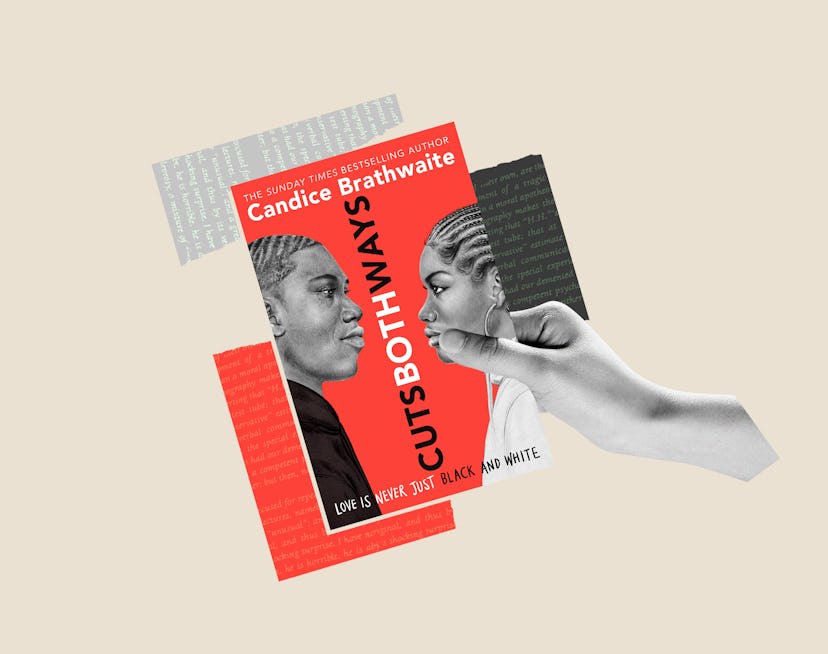Bustle Book Club
Candice Brathwaite On ‘Cuts Both Ways,’ Her Writing Rituals & Creating Book Playlists
“To have to keep rehashing those stories or dig for that kind of material, I’m very much on a break from that.”

Candice Brathwaite is tired of writing non-fiction. The Sunday Times bestselling author of I Am Not Your Baby Mother and Sista Sister has now delved into the world of fiction with her upcoming YA novel, Cuts Both Ways. “I'm really tired of mining my own life, my early years and I would say up until my early 20’s are really quite traumatic. And to have to keep rehashing those stories or dig backwards for that kind of material, I'm very much on a break from that,” Brathwaite explains over Zoom on a sunny Friday morning.
And it didn’t take long for her to develop the idea at the heart of Cuts Both Ways, in fact, it took mere hours after handing in the final manuscript for Sista Sister. “That night I was having some drinks with my husband to celebrate finishing Sista Sister, and he said to me, ‘So what's next?’, to which I initially replied with ‘Please, will you let me rest?’. But then we were talking about ideas and in three hours, Cuts Both Ways was born,” Brathwaite tells Bustle.
An exploration of race, class, and love, Cuts Both Ways is the story of 16-year old Cynthia who is uprooted from her London home by her parents after her family experiences a traumatic event and has to transition into a new private school. Cynthia finds herself caught up between two brothers at the school – one Black, one white – both, it turns out, are keeping secrets from her. Tackling the complexities of growing up as a Black British teen, Cuts Both Ways may be a love story, but it’s also a reflection of many of the issues that young Black people have to face in our society.
Below, Candice Brathwaite talks all things writer’s block, balancing writing with other projects, and her deep-seated belief in the power of a good playlist.
On not having a routine:
I am the queen of no routine. I'm the queen of “wow, let's go on a 24-hour walk and try and get inspiration.” I really admire writers who work on their books nine-to-five every day, but also writing isn't my only job. And for me, I just don't have a routine when it comes to writing.
Although what I have learned through writing Cuts Both Ways is how important a solid framework is to fiction. Writing non-fiction, I can do what I want. It's my life, I know what I'm doing; the framework is already there. Cuts Both Ways taught me that writing blind is no fun, so moving forward in my fiction career, even though I'm probably still not going to have a writing routine, I will have a better plan. Fortunately, I have a great management team and they just block time out in my calendar now to focus on my writing and that seems to be working for me, as I can now dedicate specific days to my books.
On powering through the writer’s block:
I’m a huge fan of writing through the lack of inspiration. I'd write maybe 10,000 words that essentially were rubbish. And it just reminds me of what one of my personal trainers always says: “motion is lotion.” So, if I have a particularly tough training session, he's always tells me to get out and walk or go for a jog because doing that will free up the acid in the muscles and it will be less painful. And I think it's the same with writing: motion is lotion. I just keep writing, even if I’m completely uninspired, because out of those 10,000 words, there might be that golden idea that takes me to the next chapter. Of course, I procrastinate, but at the end of the day, I come back to my desk and try to write anyway.
On her love of cafes and writing in public:
I have a really great local coffee shop which I utilise a lot because before we moved to this new house, I didn't have an office space. I would write in our bedroom after the kids went to bed or at the kitchen table. So, what I usually did is go and work in my local coffee shop, and that’s where the majority of Cuts Both Ways was written. I don't know if it's ego maybe, but for some reason I felt I was more productive in public. I think I drew a lot of energy from the sounds of people coming and going; I find it so relaxing.
On creating playlists for each book:
I adore writing to music and it’s actually one of the only ways I can properly take in information, which probably seems a bit absurd. But yes, I create and curate playlists to the point that every book I've written has a playlist on Spotify, and I make these playlists public the day that book is published.
This interview has been edited and condensed for clarity.
This article was originally published on